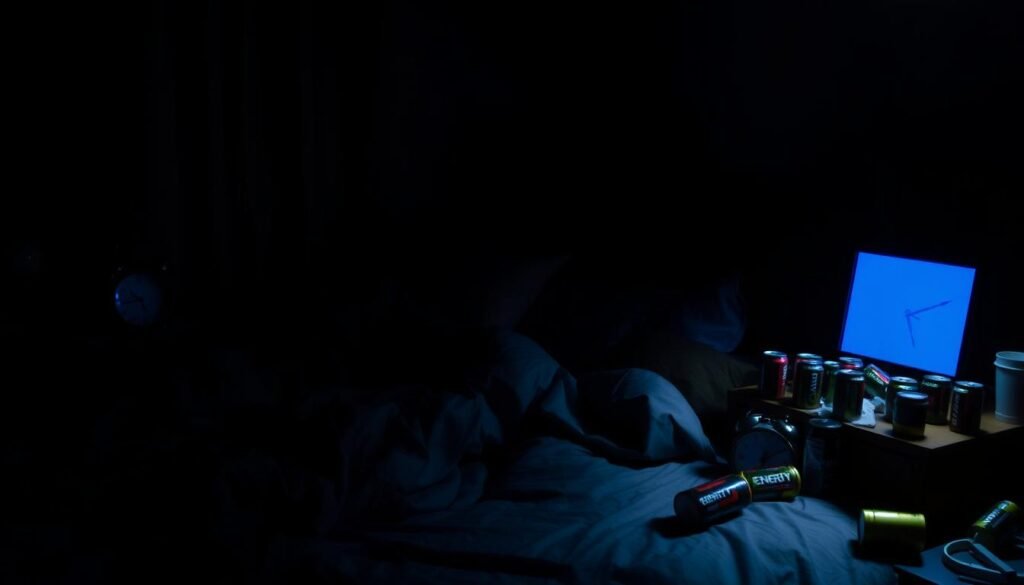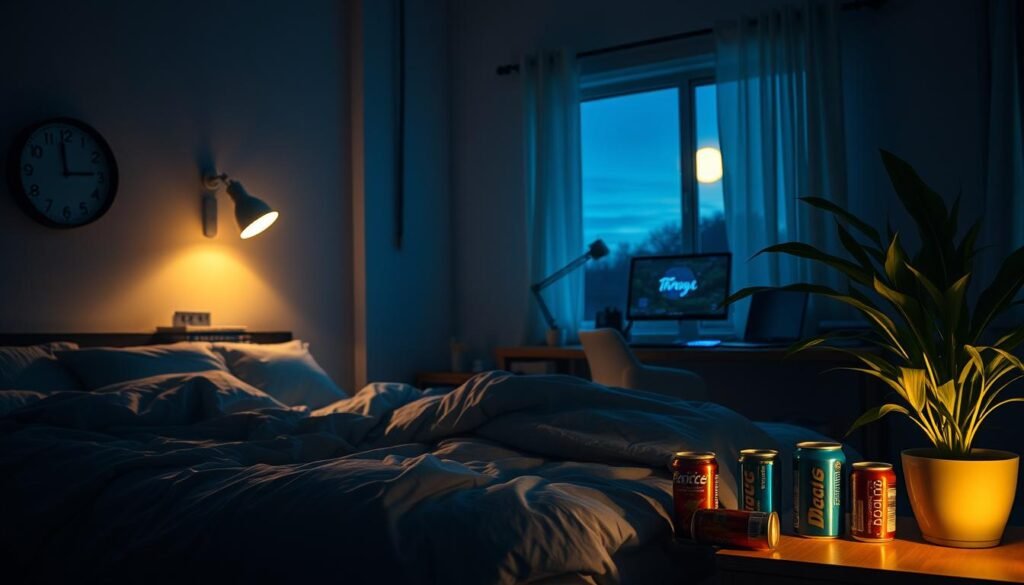Did you know around 35% of adults struggle with insomnia? It’s a common sleep disorder. It causes more than just sleepless nights. It affects your mood, health, and daily life, too. Most adults need 7 to 9 hours of sleep each night. But, many find this hard because of insomnia. Knowing why you can’t sleep is key. Insomnia can be short-term or last longer, and each has its own risks.
Short-term insomnia often comes from stress or tough life situations. It can stay for days or weeks. Yet, if it lasts for three months or more, it’s called chronic insomnia. Things like stress, your lifestyle, health issues, or medication can cause insomnia. It also gets more common as people get older. It’s important to figure out why you can’t sleep. This can help you sleep better.
Key Takeaways
- Approximately 35% of adults experience insomnia at some point in their lives.
- Short-term insomnia can result from stress or life events.
- Chronic insomnia lasts for three months or longer and can be related to various factors.
- Sleep needs vary by age; older adults often require less sleep.
- Improving sleep hygiene can significantly alleviate insomnia symptoms.
- Cognitive Behavioral Therapy (CBT) is an effective treatment option for insomnia.
Understanding Insomnia
Insomnia is a common sleep disorder many people deal with. It greatly affects their well-being. This condition can range from rare sleepless nights to lasting struggles. To understand insomnia, we must know it has many causes.
Those suffering from insomnia often feel very tired. They may also deal with anxiety and trouble focusing. These problems can reduce someone’s ability to work well and enjoy life. Knowing why insomnia happens is key. Causes can range from mental health issues to certain lifestyle choices.
Studies show stress is a big factor in causing insomnia. If you’re very stressed, you might struggle more with sleep. Older people and women report insomnia more often. Treating this sleep disorder usually needs lifestyle changes, therapy, and sometimes medicine.
Insomnia’s effects go beyond just missing sleep. It’s linked to feeling more stressed, anxious, or depressed. It’s crucial for affected people to understand insomnia well. This helps them find better ways to cope and get treatment.
Common Symptoms of Insomnia
Millions are affected by insomnia, with about 18 million Americans fighting for a good night’s sleep. Knowing the insomnia symptoms helps in managing it well. People face several problems such as:
- Difficulties falling asleep
- Frequent awakenings during the night
- Waking too early and being unable to return to sleep
- Feeling unrefreshed upon waking
During the day, the effects may include feeling tired, getting quickly irritated, and finding it hard to focus. Roughly 1 in 3 adults struggle with sleep problems that last several days, with women more affected than men. If sleep issues happen more than three nights a week for over three months, it’s called chronic insomnia.
Sleeplessness can lead to more than just being tired. The long-term sleeplessness effects can impact personal relations and work or school performance. As much as two-thirds of people might face these insomnia symptoms at times, with 10% to 15% dealing with chronic insomnia. Learning about these symptoms is key to finding good treatments and bettering sleep quality.
| Insomnia Symptoms | Daytime Effects |
|---|---|
| Difficulties falling asleep | Fatigue |
| Frequent awakenings | Irritability |
| Waking too early | Anxiety |
| Feeling unrefreshed | Difficulty concentrating |
What Are Some Causes for Insomnia
Knowing the reasons behind insomnia is key for those finding it hard to sleep. Many things can disturb sleep, greatly affecting our health. It’s important to figure out what’s causing the trouble to fix it.
Stress and Life Events
Stress is a big cause of sleep issues. High anxiety or stressful events can make sleeping hard. Insomnia can get worse with ongoing stress or big life changes. Learning to handle stress better can help. For sleep improvement tips, visit improving sleep hygiene.
Mental Health Disorders
Mental health problems also disrupt sleep. About 50% of people with depression struggle with insomnia. Anxiety makes it even harder to sleep well. Mood swings from conditions like bipolar disorder can make insomnia worse. Treating mental health is key to better sleep.
Medical Conditions Affecting Sleep
Medical conditions can also interrupt sleep. For instance, 55% of people with GI disorders have insomnia. Sleep can also be hard for those with obesity, high blood pressure, diabetes, or heart disease. Parkinson’s disease and menopause can lead to waking up often or poor sleep. Knowing these health issues can help find the right treatment.

Lifestyle Factors Influencing Sleep
Lifestyle choices are key to good sleep. Poor habits lead to sleep issues. This includes irregular sleep times and too much screen time at night. Late naps and eating big meals or drinking caffeine and alcohol before bed are also bad. These habits can make insomnia worse.
To sleep better, proper sleep hygiene is crucial. Good sleep habits involve a few important steps:
- Maintaining consistent sleep and wake times every day
- Creating a relaxing bedtime routine to signal to the body that it is time to wind down
- Optimizing the sleep environment, such as keeping the bedroom dark, cool, and quiet
Focusing on these factors can improve your sleep and health. By committing to better sleep hygiene, you’ll fall asleep easier. You’ll also enjoy more restful sleep.

Circadian Rhythm Disruption
The circadian rhythm is key to our daily sleep patterns and health. When it’s off, it’s hard to keep a regular sleep schedule. Knowing why it happens is the first step to managing it well.
Jet Lag
Jet lag happens when you travel across time zones, throwing off your body clock. It can make you feel very tired, grumpy, and less sharp. If you fly east, it’s harder to adapt because the day seems shorter.
People who travel a lot might feel worse after going through more than two time zones. To ease jet lag, try to adjust to your destination’s time zone before your trip. For more tips, check out this resource.
Shift Work Challenges
Many jobs today involve shift work, disrupting normal sleep patterns. Shift workers often get four hours less sleep, leading to stress and fatigue. Sticking to a fixed-shift schedule helps keep your body’s clock steady.
For those switching shifts, moving from day to evening is easier on the body. The more you change your schedule and the longer your shifts, the worse you might feel.

Impact of Medication on Sleep
The link between medication and sleep is complex. People who rely on medicines for health problems may affect their sleep quality without knowing. Knowing how meds impact sleep is key for those struggling with sleeplessness. Both prescription and non-prescription drugs can disrupt sleep cycles, making it hard to fall or stay asleep.
Prescription Drugs
Many prescription drugs can cause insomnia as a side effect. Drugs like SSRIs, used for depression and anxiety, might disturb sleep. Corticosteroids, which reduce inflammation, could make you more alert. Also, alpha-blockers and beta-blockers, used for heart issues, can mess with deep REM sleep and lower melatonin, hurting sleep quality.
Muscle pain from statins may affect sleep, while drugs for Alzheimer’s, like cholinesterase inhibitors, can cause nightmares or restlessness. Also, opioid painkillers can change sleep architecture and breathing patterns at night. If sleep problems arise, talking to a healthcare provider about options is helpful.
Over-the-Counter Medications
Over-the-counter meds can also affect sleep. Cold and allergy pills with pseudoephedrine can make you anxious or jittery. Painkillers with caffeine, weight loss aids, and smoking cessation products with nicotine can keep you awake. Even natural supplements like glucosamine and St. John’s wort might disturb sleep.
A 2016 study showed over 17% of American adults used meds that could disrupt sleep. Finding the right antidepressants and adjusting dosages with a doctor can help. Paying attention to how meds affect sleep can lead to better rest and well-being.
Environmental Factors Contributing to Insomnia
Many things around us can mess with our sleep. Things like noise, hot or cold rooms, and bad beds can make sleeping hard. A study found that folks in noisy or bad areas sleep less, about 7-11 minutes less, when you think about their age and sex.
Noise is a big problem when trying to sleep. If you live in a noisy spot, you might have trouble sleeping. Being comfy matters too. If it’s too hot or cold, it’s tough to sleep well. It’s key to keep your room at a good temperature for sleep.
Stress and what we do every day, like what we eat and who we hang out with, can change our sleep genes. To sleep better, we should try to make our sleeping spot nicer. This could mean better bedding, making our rooms quieter, and setting the right room temperature. Doing these things can help us sleep better.
To really get why our sleep gets messed up, we need to study more. Looking deeper into things like the air we breathe and how nice our neighborhood looks can tell us how they affect our sleep. For more details, check out this study on how our surroundings affect.
Insomnia in Different Age Groups
Insomnia shows up differently depending on a person’s age. Children, teens, and older adults face sleep challenges unique to their age group. These groups have different underlying causes and symptoms.
Insomnia in Children and Teens
For children, anxiety, busy schedules, and changing routines can lead to insomnia. They need regular sleep to stay healthy and energized. Problems like trouble falling asleep, nightmares, and waking up often can appear.
- Common symptoms include daytime sleepiness, irritability, and problems with concentration.
- Parents should monitor their child’s sleep habits closely and consult with health professionals if sleeplessness continues.
- Encouraging healthy sleep hygiene practices can significantly reduce insomnia in children and teens.
Insomnia in Older Adults
Insomnia becomes more common and challenging as people age. Factors such as health conditions and lifestyle changes play a role. Among adults, 10-30% suffer from insomnia, especially those over 60.
| Factor | Description |
|---|---|
| Health Conditions | Chronic illnesses and pain can significantly impair sleep quality. |
| Cognitive Decline | Memory and cognitive issues can disrupt normal sleep patterns. |
| Circadian Rhythm Changes | Older adults often experience a deterioration in the mechanisms regulating their circadian rhythm. |
| Medication Effects | Some medications may cause or exacerbate insomnia symptoms, leading to other health risks. |
| Sleep Quality | Older adults typically experience less slow-wave sleep and REM sleep compared to younger individuals. |
The symptoms of insomnia in older adults may include:
- Difficulty falling asleep or staying asleep.
- Frequent awakenings during the night.
- Daytime fatigue and decreased alertness.
Adopting habits like consistent bedtime routines and reducing screen time helps battle insomnia. Realizing how insomnia affects seniors’ health highlights the importance of managing it well. Focusing on sleep education and specific non-drug treatments can improve sleep for seniors.
Conclusion
Dealing with insomnia is not simple, as it requires a well-rounded approach. To improve sleep quality, it’s crucial to look at various factors. These include stress, mental health issues, and the impact of one’s job. By using good sleep habits and smart lifestyle choices, one can sleep better.
Insomnia can be short-term or last a long time, and knowing this is key. Those with long-lasting insomnia should see a sleep expert for help. They can offer targeted advice. Also, learning more about insomnia’s effects on health is beneficial. For more information, check out this article.
Good sleep is vital for doing well and feeling happy. By dealing with insomnia, people not only sleep better but also protect their health. This helps avoid the serious problems that come from not getting enough sleep.